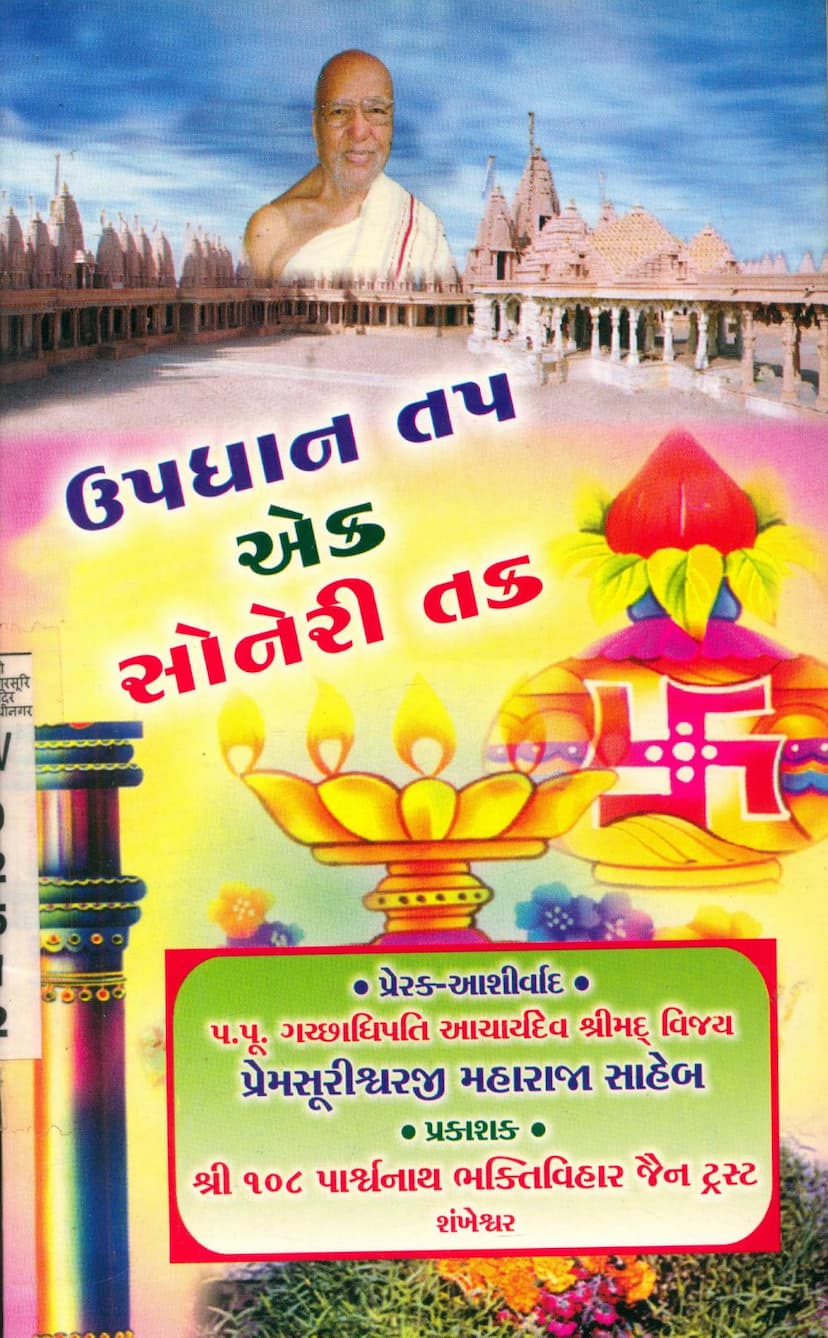Updhan Tap Ek Soneri Tak
Added to library: September 2, 2025

Summary
Here is a comprehensive summary of the Jain text "Updhan Tap Ek Soneri Tak" in English, based on the provided pages:
This book, "Updhan Tap Ek Soneri Tak" (Updhan Tap: A Golden Opportunity), published by the 108 Parshwanath Bhaktivihar Jain Trust, is a guide to the practice of Updhan Tap, a significant ritual and austerity in Jainism. The text is presented with blessings from Acharya Dev Shri Vijay Premsoorishwarji Maharaj.
Core Concept of Updhan:
- Updhan is defined as a process of detachment from worldly affairs and a journey towards inner purity and spiritual advancement of the soul.
- It is a form of Yoga (union) that enables Sadhus (monks) to gain the right and qualification to recite certain sacred mantras and scriptures. Similarly, lay followers (Shravaks and Shravikas) also undertake Updhan to qualify for reciting important Jain mantras.
- The practice involves Tapa (austerity), Japa (chanting), and Kriya (rituals).
- Tapa purifies the body.
- Japa purifies the mind.
- Kriya purifies life.
- Through this purification, the soul becomes pure and is better equipped to internalize and benefit from the scriptures.
- Mantras learned without Updhan are likened to borrowed goods that do not yield true benefit.
Types of Updhan:
The text outlines six types of Updhan prescribed for lay followers, with specific durations and associated austerities:
- Panchamangal Mahashrutkandh (Navkar Mantra): 18 days
- Pratikraman Shrutkandh (Iriyavahi, Tas Uttari): 18 days
- Shastravadhyayan (Namostu Sutra): 35 days
- Chaityavadhyayan (Arihant Cheiyana, Annathya): 4 days
- Namastavadyayan (Logassa Sutra): 28 days
- Shrutstav-Siddhstav (Pujarvar Div, Siddhana Budhana, Vaiyavacchagarana): 7 days
The total duration for all six Updhans is 110 days.
Evolution of Updhan Practices:
- Historical Practice: In the past, Updhan primarily involved fasting (Upvas) and Ayambil (a specific type of fasting where only one meal is eaten, consisting of boiled grains and water without spices or oil).
- Modern Adjustments: Due to a perceived decline in physical strength and changing circumstances, earlier Acharyas modified the rituals. Ayambil was often replaced with Nivi (a more lenient form of austerity). While the number of days for some Updhans (like the first one, from 16 to 18 days) was increased, the overall intensity of austerity was maintained. For instance, the 18-day Updhan now includes 12 fasts, a structure that balances the former practice of fewer fasts but more Ayambil.
Key Aspects of Performing Updhan:
- Daily Routine: The book details a strict daily schedule including early morning awakening, prayers, specific recitations (like "Iriyavahi"), seeking permission from the Guru for actions, performing rituals, taking vows (Pachakhkhan), listening to religious discourses (Vyakhyan), and evening rituals.
- Conduct and Discipline: A significant portion of the book is dedicated to the strict rules of conduct during Updhan. This includes:
- Pramattabhava (mindful conduct): Performing all actions with awareness, correct pronunciation, and intention.
- Physical Restraint: Walking with eyes down to avoid harming living beings, avoiding contact with raw water, vegetation, grains, etc.
- Social Detachment: Minimizing contact with family and worldly matters for the duration of the Updhan.
- Cleanliness and Purity: Meticulous cleaning of utensils, personal items, and oneself, with strict adherence to water conservation.
- Mouna (Silence): Maintaining silence during certain activities.
- Avoidance of Luxuries: No jewelry, oils, perfumes, or unnecessary beautification of the body.
- Mindfulness: Avoiding gossip, idle talk, and focusing on spiritual texts and thoughts.
- Respect for Rules: Strict adherence to all instructions and prohibitions.
- Tools and Utensils: Specific instructions are given for the use and cleaning of Updhan-related items like Muhapatti (mouth covering), Charavala (sweeping brush), Kandoora (cord), etc.
- Repentance: Recording daily transgressions and seeking forgiveness is emphasized.
- Post-Updhan Responsibility: After completing Updhan, individuals are expected to uphold the learned principles in their daily lives, setting an example and avoiding any actions that would bring disrepute to the Jain faith. They become respected figures, and their conduct is closely observed.
The "Why" of Updhan:
- Qualification for Scriptures: Updhan is essential for gaining the authority to recite sacred texts like the Navkar Mantra and others, ensuring proper understanding and efficacy.
- Spiritual Merit: It is described as a "golden opportunity" to purify oneself, accumulate merit, and advance spiritually.
- Consequences of Non-Compliance: The text sternly warns that reciting important scriptures without proper Updhan is considered disrespectful to the teachings, the Guru, and the lineage of Tirthankaras, leading to prolonged cycles of suffering in the world.
Detailed Rituals and Instructions:
The book provides specific instructions for various rituals, including:
- Morning and Evening Rituals: Detailed step-by-step procedures for interacting with the Guru, performing daily cleansing, taking vows, and prayers.
- Muhapatti Cleaning: A precise method involving 50 specific "bols" (phrases or sounds) for cleaning the Muhapatti.
- Kaussarg (Meditation): Specific instructions on performing Kaussarg for each Updhan.
- Penance: A list of potential mistakes and the required penances (like additional fasts or Ayambil) to atone for them.
- Dietary Restrictions: Emphasis on avoiding certain foods (like raw vegetables, whole pulses, pungent items) and maintaining a mindful approach to eating, including "uno dary" (eating slightly less than full).
- Daily Commitments: A summary of the austerities involves 5,000 Logass Kaussargs, 5,000 Khamasamanas, 1 lakh Navkar Mantra chants, 21 Upvas, 10 Ayambils, 16 Nivis, and 47 Paushadhs.
Concluding Message:
The book concludes by reinforcing the transformative power of Updhan Tap, highlighting that it is a path to becoming a true ascetic and a respected follower of the Jain faith. It urges individuals to maintain their spiritual discipline, uphold the teachings, and use the merit gained to contribute positively to society and ultimately achieve liberation. The text also includes a commitment to lifelong adherence to various ethical and religious practices after completing Updhan.